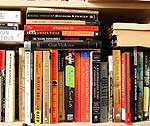Book review: A Man of Parts by David Lodge
Emma Hughes reviews a fictional account of H.G Wells’ life


Exquisite houses, the beauty of Nature, and how to get the most from your life, straight to your inbox.
You are now subscribed
Your newsletter sign-up was successful
Fictional biography
A Man of Parts
David Lodge (Harvill Secker, £18.99)
Fictionalising a real person's life is a precarious business, rather like palmistry or doing card tricks. If you pull it off, your audience and the judging panels of major literary prizes-will ooh and aah effusively at your sleight of hand. But if you misjudge things, as Monica Ali seems to have done in Untold Story (her what-if tale of Diana, Princess of Wales faking her own death), the silence is deafening.
David Lodge, the Booker-nominated novelist and critic, whose portrait of Henry James was widely acclaimed in 2004, is well placed to tackle the life of H. G. Wells. And what an extraordinary life it was. Author of dozens of books, most famously The War of the Worlds and The Time Machine, shaker-upper of the Fabian Society, diminutive and heavily moustachioed seducer of attractive young women, Wells-an outspoken proponent of both Free Love and eugenics-certainly kept himself busy. Here, we find him with only two years left to live, an elderly man reminiscing from an armchair with a rug over his knees. Sometimes, a disembodied voice interrogates him about his politics, personal life and printed works. At other points, an omniscient narrator takes the reins.
In Wolf Hall, Hilary Mantel gave us an increasingly weary, cynical Thomas Cromwell. Lodge's septuagenarian Wells, however, is a glass-half-full sort of fellow, good naturedly answering the questions put to him and looking back fondly on his many affairs. The real Wells was apparently rather less sanguine, concluding grouchily in Experiment in Autobiography (1934) that the ‘story of my relations with women is mainly a story of greed, foolishness and great expectation'.
Prof Lodge, who taught Victorian fiction at the University of Birmingham until 1987, has thrown himself into his research on Wells with gusto-the book's acknowledgements section runs to five pages. This makes for a remarkably detailed read. Did the man himself really liven up a walking tour of the Swiss Alps by canoodling with chambermaids? Was he genuinely partial to eggs, bacon, kidney, tomato and mushrooms for breakfast? It's all very absorbing.
Exquisite houses, the beauty of Nature, and how to get the most from your life, straight to your inbox.
However, there is a tendency to bludgeon the reader with facts. Whole chunks of the narrative are almost indistinguishable in tone from formal biography, and, elsewhere, the know-it-all question- and-answer format gives certain sections the clunky feel of a two-man Edinburgh Fringe show.
But when A Man of Parts is good, it's very, very good. The account of Wells's relationship with Amber Reeves, a headstrong Cambridge undergraduate whose disregard for propriety exceeded even his own, is biographical fic-tion at its best. So confidently are fact and flights of imaginative fancy interwoven that readers will find themselves unwilling and unable-to distinguish between the two. His version of the affair, invented though it may be, becomes a kind of truth. And that, as they say, is magic.
Country Life is unlike any other magazine: the only glossy weekly on the newsstand and the only magazine that has been guest-edited by His Majesty The King not once, but twice. It is a celebration of modern rural life and all its diverse joys and pleasures — that was first published in Queen Victoria's Diamond Jubilee year. Our eclectic mixture of witty and informative content — from the most up-to-date property news and commentary and a coveted glimpse inside some of the UK's best houses and gardens, to gardening, the arts and interior design, written by experts in their field — still cannot be found in print or online, anywhere else.
